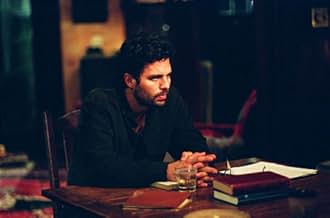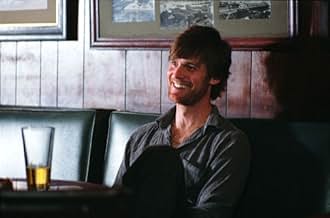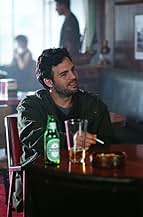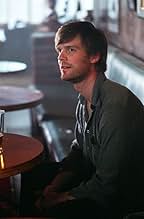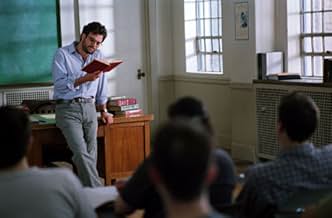IMDb रेटिंग
6.2/10
10 हज़ार
आपकी रेटिंग
अपनी भाषा में प्लॉट जोड़ेंAn indiscretion between two close friends tears down their respective marriages.An indiscretion between two close friends tears down their respective marriages.An indiscretion between two close friends tears down their respective marriages.
- पुरस्कार
- 2 जीत और कुल 4 नामांकन
फ़ीचर्ड समीक्षाएं
A serious and emotionally engaging melodrama that tells of two marriages, of love, friendship, adultery, faithfulness, parenting, and the delicate balance between being true to the spirit within and being responsible about the consequences in the real world.
Mark Ruffalo and Peter Krause play two college tutors of English literature, working away and also trying to get published in their own right in their spare time. They are close buddies and have loving, beautiful wives (Naomi Watts and Laura Dern). We have four 'ordinary people' who are far from caricatures they have sensitivities, intelligence, emotional aspiration and weakness as they struggle with their own stymied abilities to find happiness and fulfilment both for themselves and the ones they love.
We Don't Live Here Anymore looks at the reality of marriage in a less than rose-tinted light. The performances by Watts and Dern shine forth with increasing emotional intensity, and the efforts of their husbands to stage-manage some sort of acceptable compromise ricochet on the fringes of a dark despair that forever looms and threatens to engulf everyone. As the characters realise their increasingly complex shenanigans are verging on disaster, it leads them to ever deeper self-examination of their true feelings. And yet sometimes the children have a greater realisation of what's going on than do their parents. The film's closing scene ("Because I can") reminds us that the element of choice, true and ongoing, is so often lacking in marriage, sometimes even in relatively small things once marriage has been consummated, the rest becomes duty and infidelity is often driven by compulsion - so the elements of ongoing freewill (jointly and singly) can be hard to find.
This movie has been compared to Closer and rightly so it is for mature, thinking audiences who can come to terms with deep imperfections and use the depths of what it takes to be truly human to make things better (or find a way forward that has emotionally honesty). The 'moral right' will dismiss both films not so much out of a sense of superiority ('adultery never pays') but simply through lack of understanding.
The heavy-going nature of the film is alleviated by shots of rare beauty in the surrounding countryside, elegantly photographed, and by the playfulness of the several children. Watts (nearly 38 but still looking 24) and Dern (who appears older, but attractive in a very different way) each show elements of femininity that their characters are desperate to satisfy the need to be wanted and the need to be loved. To appreciate the film it is necessary to see the scenarios from both the viewpoints of the women and of the men. Everybody cares about the kids. Beyond that, the love that is expected of the spouse is at odds with the love that they try to give, so they all feel like 'objects' to their respective partners. The lack of understanding breaks down into infidelity, which (so the film might argue) can almost be a healing balm. "It's much easier living with a woman who feels loved", remarks a cuckolded husband. It's a film where no-one has all the answers (though not for want of trying) and so in some ways a testament to humanity. Sadly, many will see it as just another cynical take on dysfunctional relationships, but the open minded viewer may find a lot more, for this film is a well-made (if not exceptional) work of art that contributes more to the understanding of the human condition than any cutesy, idealised portrayal of happy families.
Mark Ruffalo and Peter Krause play two college tutors of English literature, working away and also trying to get published in their own right in their spare time. They are close buddies and have loving, beautiful wives (Naomi Watts and Laura Dern). We have four 'ordinary people' who are far from caricatures they have sensitivities, intelligence, emotional aspiration and weakness as they struggle with their own stymied abilities to find happiness and fulfilment both for themselves and the ones they love.
We Don't Live Here Anymore looks at the reality of marriage in a less than rose-tinted light. The performances by Watts and Dern shine forth with increasing emotional intensity, and the efforts of their husbands to stage-manage some sort of acceptable compromise ricochet on the fringes of a dark despair that forever looms and threatens to engulf everyone. As the characters realise their increasingly complex shenanigans are verging on disaster, it leads them to ever deeper self-examination of their true feelings. And yet sometimes the children have a greater realisation of what's going on than do their parents. The film's closing scene ("Because I can") reminds us that the element of choice, true and ongoing, is so often lacking in marriage, sometimes even in relatively small things once marriage has been consummated, the rest becomes duty and infidelity is often driven by compulsion - so the elements of ongoing freewill (jointly and singly) can be hard to find.
This movie has been compared to Closer and rightly so it is for mature, thinking audiences who can come to terms with deep imperfections and use the depths of what it takes to be truly human to make things better (or find a way forward that has emotionally honesty). The 'moral right' will dismiss both films not so much out of a sense of superiority ('adultery never pays') but simply through lack of understanding.
The heavy-going nature of the film is alleviated by shots of rare beauty in the surrounding countryside, elegantly photographed, and by the playfulness of the several children. Watts (nearly 38 but still looking 24) and Dern (who appears older, but attractive in a very different way) each show elements of femininity that their characters are desperate to satisfy the need to be wanted and the need to be loved. To appreciate the film it is necessary to see the scenarios from both the viewpoints of the women and of the men. Everybody cares about the kids. Beyond that, the love that is expected of the spouse is at odds with the love that they try to give, so they all feel like 'objects' to their respective partners. The lack of understanding breaks down into infidelity, which (so the film might argue) can almost be a healing balm. "It's much easier living with a woman who feels loved", remarks a cuckolded husband. It's a film where no-one has all the answers (though not for want of trying) and so in some ways a testament to humanity. Sadly, many will see it as just another cynical take on dysfunctional relationships, but the open minded viewer may find a lot more, for this film is a well-made (if not exceptional) work of art that contributes more to the understanding of the human condition than any cutesy, idealised portrayal of happy families.
There was a Bergmanesque quality to "We Don't Live Here Any More," recalling the passionate stories and deep psychological insights into characters in the films of the Swedish auteur filmmaker. Like Bergman, director John Curran offered a sensitive touch to the film's deliberate style of pacing and the still moments where the characters seemed lost in thought.
The story of "We Don't Live Here Any More" focuses on two married couples in adulterous relationships. The physical environments helped to convey the essence of how mismatched the individual characters were in their marriages. The characters of Jack (Mark Ruffalo) and Edith (Naomi Watts) would have seemed much more at home in the cheerful and immaculate house. By contrast, Hank (Peter Krause) and Terry (Laura Dern) would have found a better fit in the cluttered, bohemian-style home. All four performances were moving and believable. From the film's opening scene, it was easy to see how the characters were propelled to one another.
This was not a perfect film. It would have been more true to life to focus on the emotional layers of characterization instead of the sex. For the most part, the four characters seemed like good parents, and it was difficult to imagine where they would find the time to set up their trysts and be away from home for protracted periods. The genius of Bergman was to tap into those deep layers of emotional pain, which seemed remarkably absent in this film. Instead of heading out into the forest or into the car, it would have been revealing to learn more about the characters' feelings in their own homes and in their own words.
Still, after viewing "We Don't Live Here Anymore," I found myself reflecting on the characters and the relationships many days later. And that is a sign of a good film!
The story of "We Don't Live Here Any More" focuses on two married couples in adulterous relationships. The physical environments helped to convey the essence of how mismatched the individual characters were in their marriages. The characters of Jack (Mark Ruffalo) and Edith (Naomi Watts) would have seemed much more at home in the cheerful and immaculate house. By contrast, Hank (Peter Krause) and Terry (Laura Dern) would have found a better fit in the cluttered, bohemian-style home. All four performances were moving and believable. From the film's opening scene, it was easy to see how the characters were propelled to one another.
This was not a perfect film. It would have been more true to life to focus on the emotional layers of characterization instead of the sex. For the most part, the four characters seemed like good parents, and it was difficult to imagine where they would find the time to set up their trysts and be away from home for protracted periods. The genius of Bergman was to tap into those deep layers of emotional pain, which seemed remarkably absent in this film. Instead of heading out into the forest or into the car, it would have been revealing to learn more about the characters' feelings in their own homes and in their own words.
Still, after viewing "We Don't Live Here Anymore," I found myself reflecting on the characters and the relationships many days later. And that is a sign of a good film!
If "We Don't Live Here Anymore" had been made in the 1960s, it might have been titled "Jack and Terry and Hank and Edith". To borrow the title of another celebrated 60s film, "We Don't Live Here Anymore" is about carnal knowledge in the 21st century.
The film has a few interesting lines in it. Some have a hollow ring to them. Take the statement that "Even adultery has morality to it." The film does not appear to bear this out. Right or wrong don't seem to come into the picture at all. It seems as if anything goes as long as it makes people "happy". As Hank (Peter Krause) says, "It's easier living with a woman who feels loved" -- even if it is by your best friend Jack (Mark Ruffalo). Far closer to the truth is Mark's comment to his children that the arguments they overhear between their parents are just "adult foolishness". They certainly seem to be compared to the savvy of the kids, who are old beyond their years.
The situation (and the situational ethics) of the film may seem a tad unreal or surreal. But the film is solidly grounded in reality, as embodied by the environment in which the two couples live -- their home lives, their children, the very houses they inhabit.
The music of the film is well chosen, alternating between the drama of operatic or chamber music, and jazz rhythms that sound like a jungle beat -- the beat of sexual heat and passion.
The best of the four lead actors is Laura Dern as Terry. To my mind, she is the only fully rounded and entirely comprehensible character. Dern's setpiece speech about her husband treating her like a dog has the ring of Oscar to it. To be frank, Dern's shaggy mane and thin frame make her look a lot like a dog -- an Afghan or a Lhasa Apso, perhaps -- but she should definitely not be written off as a bitch. On the contrary, we understand and sympathize with her drinking and her anger at being cast aside by her wayward husband Jack.
Mark Ruffalo, as Jack, is harder to understand and to sympathize with. He comes across as too self-centered and callous. Even in his treatment of Edith (Naomi Watts), he seems to think only of himself and his sexual needs. He claims to "love" her, but their relationship is essentially physical. Jack is basically a wuss and a coward who, when push comes to shove, cannot leave his wife and cannot even be honest with his kids about how things stand between their parents. And you get the definite impression that Jack cares more about the children than about Terry. (That being said, the camera absolutely loves Mark Ruffalo with his dark, liquid brown eyes and full, sensual lips.)
By comparison, Peter Krause (Hank) and Naomi Watts (Edith) are less interesting and more like plot devices than real people. Hank is a professor and author with writer's block who has the hots for one of his students, but not for his pretty wife. Hank is no slouch himself in the looks department, but Edith's interests lie across the fence. It is even harder to understand their motivations than Jack's.
Still, "We Don't Live Here Any More" is a fascinating look at modern sexual mores, and Laura Dern is a powerhouse who lights up the screen. Again, don't be surprised if her name is put forward for the coveted golden statuette. You heard it here first!
The film has a few interesting lines in it. Some have a hollow ring to them. Take the statement that "Even adultery has morality to it." The film does not appear to bear this out. Right or wrong don't seem to come into the picture at all. It seems as if anything goes as long as it makes people "happy". As Hank (Peter Krause) says, "It's easier living with a woman who feels loved" -- even if it is by your best friend Jack (Mark Ruffalo). Far closer to the truth is Mark's comment to his children that the arguments they overhear between their parents are just "adult foolishness". They certainly seem to be compared to the savvy of the kids, who are old beyond their years.
The situation (and the situational ethics) of the film may seem a tad unreal or surreal. But the film is solidly grounded in reality, as embodied by the environment in which the two couples live -- their home lives, their children, the very houses they inhabit.
The music of the film is well chosen, alternating between the drama of operatic or chamber music, and jazz rhythms that sound like a jungle beat -- the beat of sexual heat and passion.
The best of the four lead actors is Laura Dern as Terry. To my mind, she is the only fully rounded and entirely comprehensible character. Dern's setpiece speech about her husband treating her like a dog has the ring of Oscar to it. To be frank, Dern's shaggy mane and thin frame make her look a lot like a dog -- an Afghan or a Lhasa Apso, perhaps -- but she should definitely not be written off as a bitch. On the contrary, we understand and sympathize with her drinking and her anger at being cast aside by her wayward husband Jack.
Mark Ruffalo, as Jack, is harder to understand and to sympathize with. He comes across as too self-centered and callous. Even in his treatment of Edith (Naomi Watts), he seems to think only of himself and his sexual needs. He claims to "love" her, but their relationship is essentially physical. Jack is basically a wuss and a coward who, when push comes to shove, cannot leave his wife and cannot even be honest with his kids about how things stand between their parents. And you get the definite impression that Jack cares more about the children than about Terry. (That being said, the camera absolutely loves Mark Ruffalo with his dark, liquid brown eyes and full, sensual lips.)
By comparison, Peter Krause (Hank) and Naomi Watts (Edith) are less interesting and more like plot devices than real people. Hank is a professor and author with writer's block who has the hots for one of his students, but not for his pretty wife. Hank is no slouch himself in the looks department, but Edith's interests lie across the fence. It is even harder to understand their motivations than Jack's.
Still, "We Don't Live Here Any More" is a fascinating look at modern sexual mores, and Laura Dern is a powerhouse who lights up the screen. Again, don't be surprised if her name is put forward for the coveted golden statuette. You heard it here first!
John Curran presents a very unsettling view on fragile relationships. At the centre of the story there are two married couples and from their interactions one can easily conclude that there was once a lot of love within the couples and a strong friendship between them and now, well in the case of Hank and Edith, the love is vanishing into thin air. Edith still yearns for Hank's love but Hank is too self-absorbed in his self-perceived failure and careless about his wife's infidelity. Terry still deeply loves Jack who is going through a mid-life crisis (like Hank) and finds comfort, both sexual and emotional, with Edith. At the center of their relationships are the children of the respective couples who are the most vulnerable ones. The film is a shocking portrayal of relationships and friendships that have reached a stage where indifference, obligation, guilt, loneliness and despair take over. Curran also adds some doses of humour that is subtle and welcoming (at the same time non-intrusive).
The cinematography is fantastic and editing is wonderful. I especially liked how the camera jumps from one character to another, showing what they are going through, during a constant time period. The score contributes to the gloominess but in a non-intrusive and non-melodramatic way. It is rather gentle and flowing smoothly.
'We Don't Live Here Anymore' showcases four exceptional performances. Ruffalo is both hateful and sympathetic as Jack. The remarkable Laura Dern is explosive and fiery as Terry. Her Terry is the strongest of the four and Dern is both gripping and haunting. Both Ruffalo and Dern benefit from well-defined roles (but even otherwise they are great actors as has been evident in their other movies) though there was the risk that had the roles been played by lesser actors, they could have easily become caricatures. However, the characters Hank and Edith depend more on the actor's performances. Naomi Watts shows immense depth through a wonderfully restrained performance while Peter Krause brilliantly downplays and brings a rawness to his part and his facial expressions speak volumes.
'We Don't Live Here Anymore' is certainly not a positive look at relationships. The friendship between the couple is strong and there is an understanding between them that shows that they care for each other. Notice in the later scene when Dern's Terry tries to comfort Watts's Edith and the chats between Hank and Jack are proof enough. Even though the words aren't said, they only know each other too well and maybe it is respect that is losing its hold and probably friendship will too. Curran's film tells a meaningful raw story that is honest, brutal, daring and unsympathetic to its characters.
The cinematography is fantastic and editing is wonderful. I especially liked how the camera jumps from one character to another, showing what they are going through, during a constant time period. The score contributes to the gloominess but in a non-intrusive and non-melodramatic way. It is rather gentle and flowing smoothly.
'We Don't Live Here Anymore' showcases four exceptional performances. Ruffalo is both hateful and sympathetic as Jack. The remarkable Laura Dern is explosive and fiery as Terry. Her Terry is the strongest of the four and Dern is both gripping and haunting. Both Ruffalo and Dern benefit from well-defined roles (but even otherwise they are great actors as has been evident in their other movies) though there was the risk that had the roles been played by lesser actors, they could have easily become caricatures. However, the characters Hank and Edith depend more on the actor's performances. Naomi Watts shows immense depth through a wonderfully restrained performance while Peter Krause brilliantly downplays and brings a rawness to his part and his facial expressions speak volumes.
'We Don't Live Here Anymore' is certainly not a positive look at relationships. The friendship between the couple is strong and there is an understanding between them that shows that they care for each other. Notice in the later scene when Dern's Terry tries to comfort Watts's Edith and the chats between Hank and Jack are proof enough. Even though the words aren't said, they only know each other too well and maybe it is respect that is losing its hold and probably friendship will too. Curran's film tells a meaningful raw story that is honest, brutal, daring and unsympathetic to its characters.
Not a heart-wrenching film but illuminates with precision the dynamics of friendship, marriage and adultery. It shows a potent portrait of two couples whose marriages are going to break; has an enormous power and tells some uncomfortable truths. In this movie actions have consequences that are not resolved with a hug or a cry. The four grown-ups (as well as their children who are perfectly aware of the situation) are very talented and all deliver passionate and compulsive performances. The atmosphere lingering in the air is what impressed me the most, being the flick filled with very expressive glances and electrical silences. Mark Ruffalo and Naomi Watts always very gifted.
क्या आपको पता है
- ट्रिवियाThe Irish step dance scene starts with a cutaway where the center dancer is actually a male dancer.
- भाव
[last lines]
Edith Evans: I'm not leaving you because you're unfaith Hank, I'm leaving because I was.
Hank Evans: Look, none of that matters any more. It's over. Isn't it? Isn't it, Edith?
Edith Evans: Yeah. It's over.
Hank Evans: Well then, why leave now?
Edith Evans: Because I can.
- क्रेज़ी क्रेडिटSpecial Thanks To Christine & Ben Christine, Terry & Kelly Kris & Fisher
- कनेक्शनFeatured in The 20th IFP Independent Spirit Awards (2005)
- साउंडट्रैकJungle Warrior
Written by John Otieno
Performed by Matata
Courtesy of President Records Ltd. UK
टॉप पसंद
रेटिंग देने के लिए साइन-इन करें और वैयक्तिकृत सुझावों के लिए वॉचलिस्ट करें
- How long is We Don't Live Here Anymore?Alexa द्वारा संचालित
विवरण
- रिलीज़ की तारीख़
- कंट्री ऑफ़ ओरिजिन
- आधिकारिक साइटें
- भाषा
- इस रूप में भी जाना जाता है
- La Tentación
- फ़िल्माने की जगहें
- उत्पादन कंपनियां
- IMDbPro पर और कंपनी क्रेडिट देखें
बॉक्स ऑफ़िस
- बजट
- $30,00,000(अनुमानित)
- US और कनाडा में सकल
- $20,41,014
- US और कनाडा में पहले सप्ताह में कुल कमाई
- $1,01,295
- 15 अग॰ 2004
- दुनिया भर में सकल
- $33,61,213
- चलने की अवधि
- 1 घं 41 मि(101 min)
- रंग
- ध्वनि मिश्रण
- पक्ष अनुपात
- 2.35 : 1
इस पेज में योगदान दें
किसी बदलाव का सुझाव दें या अनुपलब्ध कॉन्टेंट जोड़ें


